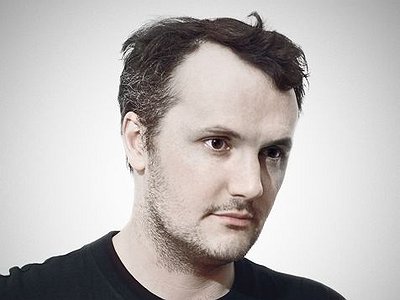Self-reliance
Elverum’s sound check was over with pretty quickly. On returning to the hall, he wandered over to make a sandwich before he decided that we should find somewhere quiet. We headed through the actual venue, the Union Chapel is a working church with a large slanted floor and mezzanine packed with row upon row of timber pews, shiny with age and a cavernous domed ceiling.
We ended up in the front room of the church. We’d talked enough about the concrete stuff; it was time to get into that nebulous line of questioning, to find out what drives the man behind Mt Eerie? Sometimes musicians hate talking about this sort of thing but luckily for me, Elverum was feeling generous.
Whether he knows it or not, Elverum has a lot in common with his name sake (his middle name is Whitman) and also with that academic hell-raiser he’s been so influenced by, Henry David Thoreau. Like his transcendental forbearers, Elverum’s beliefs centre on self-reliance and a spiritual connection to the physical world. These poets and essayists of the new world believed that connecting to the things around us, can lead to a better understanding of the world and transcendence beyond the material.
Unlike his more politically oriented brothers however, Elverum is not that interested in resistance or opposing the status quo, that path never really suited him. ‘I began to realise that I had this forum. It’s hard to ignore the reality that people are listening to what I’ve got to say. I started saying, “you should do this” in my songs. But that kind of approach didn’t feel right. It’s hard to think of nice political songs or art that is beautiful. I prefer to make something more abstract and emotional. I like to get my ideas across in a less direct message.’ Elverum now prefers to sing about his own experiences in the hope that others will relate.
In Song of Myself, Walt Whitman famously used his own point of view as a way of connecting to his reader. This first person perspective, where ‘I’ means ‘Us’ assumes the identity of the poet and the reader at once, removing any authoritarian intrusion on the message.
The similarities don’t end there. Where Whitman’s life’s work was Leaves of Grass, which he self-published and spent a lifetime adding to and perfecting, Elverum spends his time on Mt Eerie, self publishing, re-working and releasing variations on his own theme, his own life’s work. What began with music created with The Microphones and took hold as Mt Eerie in Wind’s Poem, has now continued with Clear Moon and Ocean Roar. Once again Elverum’s music is about his place in the world, in every sense.
‘I just love that place. It's my home it's where I’m from. That’s what interesting to me is what it means to be a person in a particular place. Walking around and paying attention to these slower processes of the land and the seasons and the weather. This kind of slower and more deliberate way of living, that I think is in us because we are animals of the land and we’ve only recently developed this culture and society and where we can not know where food comes from. We’ve got plenty to worry about but its all around this structure that we’ve built up. There’s something kind of instinctual about relating to the way the light hits the hill on the horizon.’
I ask if it gets hard to see the beauty of life around you after being in one place for so long. Does he find it hard to summon that freshness of perspective?
‘It’s a little bit of an effort for me. Because the reality of my life is like, I drive my car to the store, I’m like not fully immersed in that indigenous lifestyle. I’m focusing on that aspect. I’m trying to help it along and I think it’s there for all of us, whether you’re living in the city or whatever. Yeah, I mean I don’t know. I don’t know if that would be any different if I was moving around all the time. Inspiration is weird I don’t know where it comes from and it comes at the most random times. So yeah that’s why I make albums about this stuff, ‘nature’ or the non human world.’
Evlerum’s perennial fascination with the natural world and it’s various mysteries are evident in his work. I ask him if he’s still connected to this love of mystery.
‘I guess I’m still in it. Not so much in the Twin Peaks vibe although a little bit. The synth sounds are directly inspired by Twin Peaks music and then from there I got into other synthetic sounding music which until then was not even on my radar. I’m still into mystery as a thematic tool, as a way of understanding the world. Maybe an antithesis to religions.’
If religions are supposed to be about enlightenment and even transcendence, and mystery is about keeping things hidden and imagined, then how, I ask, does he reconcile these two opposing notions in his head?
‘I think that my stuff is probably if I were to be totally honest about it, a lot of the ideas that I’m trying to enunciate reflect a more or less Buddhist ideology. Even though I’m not Buddhist, at all, I come across these same ideas. They’re so inspiring especially a lot of the Asian poetry.’
As is his way, Elverum is careful not to let this become yet another way to stereotype him. Unlike his hero Gary Snyder, Elverum doesn’t practice Buddhism. While likes to borrow the ideas he is mindful not to appear reductive which is probably why he's never mentioned these influences in the past.
He’s (Snyder) comfortable owning it, he’s like ‘yes I’m a Buddhist. I think for me, as a child of the hippy generation, there’s a stigma attached to casual Buddhists. I’m hesitant to flaunt it, like to put Buddha on my album cover or whatever.’ Elverum laughs it off, but he means it. Just because he chooses not to adopt the ideology doesn't mean he is disregarding or diminishing the value of it. It is not so much the dogma that has influenced him, rather the broader ideas and how they’ve been expressed in poetry created by Buddhists in ancient literature.
‘Within those poems there would be these ideas about very simple symbolic things like, the moon, or a river or the author acknowledging somebody passing by the gate and the blossoms. I love these icons of Asian poetry …but then once it gets into like the complicated systems of Buddhism it loses me. I’m taking things from that tradition and reframing them in my world. I think that’s a big key to my stuff that doesn’t often get talked about or noticed by people.’








